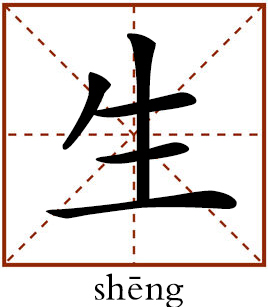live

As one of the most common Chinese characters, sheng has various meanings. As a verb, it means "to give birth, bring up, grow, or live." As a noun, it refers to life, lifetime or a living being.
生于忧患,死于安乐
shēng yú yōu huàn, sǐ yú ān lè
Sheng means "to live or survive" and si "die." You huan refers to sorrow and calamity. An le refers to ease and pleasure. This term suggests that to a nation or an individual usually thrives in calamity and perishes when faced with soft living.
This is a famous quote from the Mencius, a collection of conversations and series of transcribed interviews with Mencius (c. 372―289 BCE), who stands second only to Confucius in the main stream of the Confucian School. Born into troubled times, when China was politically fractured and socially and economically chaotic, Mencius vigorously proposed Confucian doctrines as the solution for China’s problems.
In the text, Mencius said, "When Heaven is about to confer a great office on any man, it first exercises his mind with suffering, and his sinews and bones with toil. It exposes his body to hunger, and subjects him to extreme poverty. It confounds his undertakings. By all these methods it stimulates his mind, hardens his nature, and supplies his incompetencies. Men for the most part err, and are afterwards able to reform. They are distressed in mind and perplexed in their thoughts, and then they arise to vigorous reformation. When things have been evidenced in men's looks, and set forth in their words, then they understand them. If a prince has not about his court families attached the laws and worthy counsellors, and if abroad there are not hostile States or other external calamities, his kingdom will generally come to ruin. From these things we see how life springs from sorrow and calamity, and death from ease and pleasure" (trans. James Legge).
Mencius's quote has been proved a few times in Chinese history, such as during the Northern Song Dynasty (960―1127), which enjoyed ease and pleasure in spite of the threat of its powerful nomadic neighbors, until the final conquest by nomadic invaders. Today Mencius's thoughts are important beyond the circumstances of their origins. The spirit of working hard and overcoming crisis is still highly valued by the Chinese people.
Edited by REN GUANHONG
